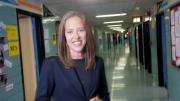Two decades ago, many educators thought urban schools could improve only if progress was made against poverty. Wendy Kopp thought there was another way to make a difference. She began recruiting graduates of top universities to serve as teachers in the toughest schools around the country, hoping their enthusiasm and passion for social justice could change the lives of urban students—as well as their own career paths.
“To me what we are doing is about the values of our country,” Kopp said in a March 8 speech at Harvard. “Twenty years ago, zillions of dollars were spent recruiting the next generation of leaders to go spend two years working in corporate America. We started thinking, ‘Let’s start aggressively recruiting those people to channel their energy into some other place than Wall Street. Let’s channel their energy into low-income schools.’”
Today the program Kopp founded, Teach for America (TFA), has more than 9,000 corps members in more than 43 geographic regions, making it one of the largest educational-leadership programs in the country. And in 2011, no institution of its size sent more students into TFA training than Harvard, which saw 66 graduates join the ranks this past fall. More than 440 Harvard alumni have taught as corps members—a number that will surely rise again with dozens more expected to join after they graduate this year. (TFA is one of the partner organizations for HGSE’s doctor of education leadership program, a three-year, practice-oriented degree aimed at preparing a small cohort of leaders who can effect major changes in K-12 education.)
Speaking to a packed room in the Graduate School of Education's main lecture hall, Kopp recounted the birth of the program she started in 1989 as a senior at Princeton, and its massive growth since—she hopes to boost the number of TFA alumni to 40,000 within the next five years.
Joining Kopp on the panel were three of those alumni. All said they were profoundly changed by their experiences working as teachers in urban schools.
“I didn’t go into Teach for America thinking I’d be a career educator,” said Aaliyah El-Amin, Ed.D. ’15, who became a corps member in 2000 after she stumbled on a TFA poster on her college campus. “But I was profoundly changed by the faces and stories and hearts of the little people in my classroom.”
Erasmo Montalván, Ed.M. ’12, a former corps member in Chicago, said the program is not just focused on expansion for its own sake, but is also about supporting inner-city teachers who have not been given proper training by their local school systems. “In our multiple wars going on, we never criticize soldiers, we always criticize the leadership. But in our profession, it’s always the teachers,” Montalván said. “We should be helping teachers—coaching and mentoring them. I’m in this school-leadership program so that I can go back and become a principal in the great city of Chicago and provide that kind of support.”
Kopp also addressed critics of TFA, most notably education historian Diane Ravitch, who has questioned the long-term effects of the two-year program, calling it a “revolving door.” Kopp responded that the program is about more than two years: “Two-thirds of TFA alumni are still working in education, and of the third who are not, half have jobs related to schools in low-income communities,” she said, also noting that only 3 percent of all former corps members now work in the private sector.
“Every year of a teacher’s effort can change these kids, but the real reason to do it is that this experience is going to fundamentally change these people [TFA members],” Kopp said. “It’s going to change every single decision they make thereafter. It’s going to change their career paths; it’s going to change their priorities.”









